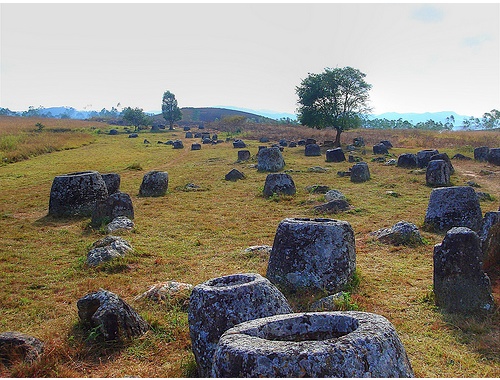Mother’s Beloved is a collection of short stories from Laos; even with an introductory essay and with the Lao printed opposite the English, it’s only 160 pages. BTW, I don’t know a lot about Lao names, but I think that ‘Outhine’ is the surname.
I knew absolutely nothing about Laos except its approximate location (between Thailand and Vietnam). Fortunately this book has an essay about contemporary Lao literature that acted as a quick primer on the country’s modern history, which has been fairly grim: it went from being a Thai colony to a French one, got caught up in the Indochina War and the Vietnam War, when the Americans bombed it extremely heavily, then had about 15 years of communist government. Apparently it has liberalised somewhat since the fall of Russian communism, but there’s still only one legal political party: the Lao People’s Revolutionary Party.

The stories themselves are short and simple, both stylistically (as far as I can tell from these translations) and in terms of action. And indeed morality: by which I mean that you could often end each story with ‘and the moral of this story is … [something].’ I don’t think it’s a coincidence that most of them were published when Laos was a communist state; I think some of that simplicity that comes from writing in a country where too much ambiguity might be regarded as politically suspicious. And often the ‘morals’ are as much political as moral: ‘every one of us, no matter how humble, can make our own sacrifice in aid of the war effort’, for example.
Still, the very simplicity of the stories has its own appeal, and one or two of them managed to combine that simplicity with just the right emotional note in a way I found effective. I’ve decided that one way I could make these little reviews more useful would be quote some of the books, so here’s the opening of a story called The Eternal Pair of Birds. It’s actually an unusually elaborate passage, but you can see it has a kind of plainness to the language.
It was late February. At the edge of the rice fields grew a flame tree full of red blooms whose colour, when reflecting the setting sun, was so bright it hurt the eyes. Next to it stood a lone palmyra. It stretched so high as if to challenge the rainstorm, the hurricane, and the sunshine. It had stood there, strong and graceful, for ages. To the people in this rural hamlet, it was like a timepiece. When the sun was high above its crown, it was noon. When the sun’s rays struck parallel across the top of its fronds, it was time to herd the cattle back to the stable and for the housewives to prepare dinner.
Mother’s Beloved is my book from Laos for the Read The World challenge. I quite enjoyed it, on balance, and if nothing else, it encouraged me to learn a bit more about the country.
» The picture is from the Plain of Jars, an archeological site in Laos which I hadn’t heard of before but is mentioned in one of the stories. The stone ‘jars’, about 1500-2000 years old, are of unknown purpose but may be funerary urns or for food storage. Apparently it’s now one of the most dangerous archeological sites on earth because of all the left-over American cluster bombs. The photo, from Flickr, is © Kumar Nav and used under a CC by-nc-nd licence.